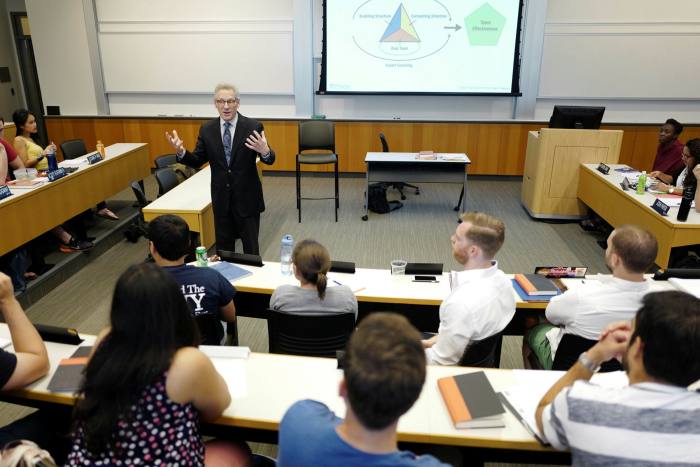
[ad_1]
High salaries for American MBA graduates helped US business schools top the FT 2022 rankings after a year of bringing strong demand for degrees amid the disruption of the pandemic.
Wharton and Columbia finished first and second, respectively, ahead of Harvard, Northwestern: Kellogg, Stanford, Chicago: Booth, Yale, MIT, NYU: Stern and Berkeley: Haas—all of which were among the 16 schools in the top tier of the 100 institution rating.
On the other hand, France and Singapore are in third place. Others at the top level include London Business School, Iese in Barcelona, HEC Paris, SDA Bocconi in Milan and China Europe International Business School (Ceibs) in Shanghai.
Three years after graduation, alumni of The Wharton School of the University of Pennsylvania report the highest overall annual average income in 2021, at $238,000, after removing the salaries of those who enter lower-paying jobs, such as the public sector. The overall median salary for alumni of the 100 schools ranked this year is $161,000, after adjusting for worldwide purchasing power parity.
FT 2022 Global MBA Rankings — top 100

A class at Wharton School
Find out which schools are in our MBA degree rankings. Learn how tables are compiled and read our other coverage at www.ft.com/mba.
While many business schools have been pressured by the decline in non-diploma executive education during the pandemic, MBAs are holding up well. “We beat our expectations in terms of intake,” said Francois Ortalo-Magné, dean of the London Business School. “Demand is very strong for our full-time program.”
Among the 81 schools ranked in the last three years, total MBA admissions rose to 14,566 in 2021, up from 14,168 in 2019 and signaling a recovery after dropping to 13,534 in 2020. Average alumni salaries rose over the period (2019- 21) from $130,875 to $141,949, without adjusting for inflation and exchange rates.
A survey last year by the Graduate Management Admissions Council showed that 37 percent of recruiters expect MBA recruiting to increase over the next five years, compared with 30 percent of those who responded in 2020. A separate survey showed that the majority of FT-ranked business schools reported an increase in students. international candidates, especially from India, offset the decline in domestic candidates.
The FT rankings are based on data provided by participating schools and alumni, with significant weight being given to salaries and salary increases three years after completion, as well as factors including academic research outcomes, and student and faculty diversity as measured by a mix of gender and nationality.
Andrew Crisp, head of education consultancy CarringtonCrisp, said that business schools need to continue to evolve as newer forms of digital business training develop. “International, entrepreneurship, technology, sustainability are buzz words,” he said. “It is very important that the MBA adapts to the world. Otherwise, it will be in a very difficult position.”

Andrew Crisp says digital formats for training put the onus on business schools to thrive
Half of the 100 FT-ranked schools—which must be accredited by the Association to Advance Collegiate Schools of Business or Equis, two leading international institutions—are based in the US, the home of the MBA and where qualification remains important for many seeking management roles or advancement within them.
Nine schools are ranked in the UK, with smaller numbers in other European countries, Canada and Australia. However, as a sign of the geographical expansion of business education, there are six rankings in China, three in Hong Kong, four in India and one in Mexico and South Korea respectively.
Harvard scores the highest for research outcomes, measured by staff publications in journals on the FT50 list, weighted by faculty size. It was followed by Wharton and Chicago: Booth.
In a sign of the growing focus on sustainability, about a third of the top 100 schools report that they have completed a carbon emissions audit on their campus and a quarter include the most comprehensive Scope 3 emissions, which include indirect contributors such as travel.
As pressure builds on governments to limit global warming to less than 2C above pre-industrial levels, 19 schools say they aim to achieve net zero carbon emissions within 20 years. Iese got the top score for the integration of environmental, social and governance factors, followed by Ohio State University: Fisher and Edhec from France.
University of Florida: Warrington tops the rankings for value for money — calculated on current income after accounting for tuition and lost income during study — followed by Lancaster University Management School in the UK and Brigham Young University: Marriott in the US.
None of the ranking schools reported gender equality among faculty, although 49 percent at IE Business School in Spain were female. Six of the nine schools where girls make up more than half of students are in Asia, led by the Faculty of Economics and Management of Tongji University and the School of Management of Fudan University in China.
The largest salary increases reported by students three years after completion compared to earnings before starting their MBA were at the Indian School of Business, Fudan and Mexico’s Ipade School of Business.
[ad_2]
Source link
